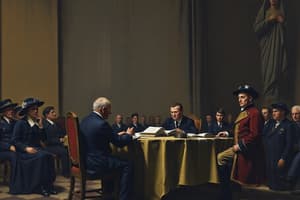Podcast
Questions and Answers
What was Georges Clemenceau's primary objective at the Treaty of Versailles?
What was Georges Clemenceau's primary objective at the Treaty of Versailles?
- Establish the League of Nations
- Promote self-determination for nations
- Encourage leniency towards Germany
- Demilitarize the Rhineland (correct)
Which of the following was NOT a motive for Woodrow Wilson at the Treaty of Versailles?
Which of the following was NOT a motive for Woodrow Wilson at the Treaty of Versailles?
- Reparations to compensate for war damages (correct)
- Self-determination for nations
- Promotion of lasting peace
- Establishment of the League of Nations
What was one of David Lloyd George's key motives during the negotiations?
What was one of David Lloyd George's key motives during the negotiations?
- To establish a European Parliament
- To punish Germany severely
- To prevent the economic collapse of Germany
- To maintain British naval superiority (correct)
What major concern did Clemenceau have regarding Germany?
What major concern did Clemenceau have regarding Germany?
How did Woodrow Wilson view reparations for Germany?
How did Woodrow Wilson view reparations for Germany?
Which territory did Clemenceau aim to regain for France?
Which territory did Clemenceau aim to regain for France?
What was a notable contrast between the damage experienced by the U.S. and that suffered by France during World War I?
What was a notable contrast between the damage experienced by the U.S. and that suffered by France during World War I?
What was one of the main objectives for Lloyd George regarding Germany?
What was one of the main objectives for Lloyd George regarding Germany?
Which of the following best characterizes the attitude of the 'Big Three' towards Germany?
Which of the following best characterizes the attitude of the 'Big Three' towards Germany?
How many soldiers approximately died from the United States during World War I?
How many soldiers approximately died from the United States during World War I?
What was a major outcome of the Treaty of Versailles regarding Germany's military?
What was a major outcome of the Treaty of Versailles regarding Germany's military?
Which leader advocated for harsher measures against Germany during the treaty negotiations?
Which leader advocated for harsher measures against Germany during the treaty negotiations?
How did World War I impact Britain's economy?
How did World War I impact Britain's economy?
What amount in reparations was imposed on Germany by the Treaty of Versailles?
What amount in reparations was imposed on Germany by the Treaty of Versailles?
What role did David Lloyd George play during the treaty negotiations?
What role did David Lloyd George play during the treaty negotiations?
Which of the following best represents the primary conflicting priorities among the Big Three leaders?
Which of the following best represents the primary conflicting priorities among the Big Three leaders?
What was a long-term effect of the terms imposed on Germany by the Treaty of Versailles?
What was a long-term effect of the terms imposed on Germany by the Treaty of Versailles?
Which aspect of the Treaty of Versailles reflected Wilson's focus on fairness?
Which aspect of the Treaty of Versailles reflected Wilson's focus on fairness?
The disagreements among the Big Three contributed to which outcome in the Treaty of Versailles?
The disagreements among the Big Three contributed to which outcome in the Treaty of Versailles?
What was the primary source of conflict during the negotiation of the Treaty of Versailles?
What was the primary source of conflict during the negotiation of the Treaty of Versailles?
Flashcards
Treaty of Versailles
Treaty of Versailles
The Treaty of Versailles was a peace treaty signed in 1919 after World War I. It aimed to punish Germany for its role in the war, but also aimed to create lasting peace and security for the future.
What were the main goals of the Treaty of Versailles?
What were the main goals of the Treaty of Versailles?
The main goals of the Treaty of Versailles were to punish Germany for its role in the war, to ensure that Germany would not be able to start another war in the future, and to create a system of international cooperation to prevent future wars.
Georges Clemenceau's motives at Versailles
Georges Clemenceau's motives at Versailles
Georges Clemenceau, the French representative at the Treaty of Versailles, wanted to ensure France's security by weakening Germany, making Germany pay for the damage caused by the war, and regaining lost territories.
Clemenceau's objectives at Versailles
Clemenceau's objectives at Versailles
Signup and view all the flashcards
Woodrow Wilson's motives at Versailles
Woodrow Wilson's motives at Versailles
Signup and view all the flashcards
Woodrow Wilson's objectives at Versailles
Woodrow Wilson's objectives at Versailles
Signup and view all the flashcards
David Lloyd George's motives at Versailles
David Lloyd George's motives at Versailles
Signup and view all the flashcards
David Lloyd George's objectives at Versailles
David Lloyd George's objectives at Versailles
Signup and view all the flashcards
Impact of World War I on the Treaty of Versailles
Impact of World War I on the Treaty of Versailles
Signup and view all the flashcards
Impact of conflicting objectives on the Treaty of Versailles
Impact of conflicting objectives on the Treaty of Versailles
Signup and view all the flashcards
Physical Cost of WWI
Physical Cost of WWI
Signup and view all the flashcards
Conflicts Between the 'Big Three'
Conflicts Between the 'Big Three'
Signup and view all the flashcards
Clemenceau's Stance on Germany
Clemenceau's Stance on Germany
Signup and view all the flashcards
Wilson's Idealism
Wilson's Idealism
Signup and view all the flashcards
Lloyd George's Pragmatism
Lloyd George's Pragmatism
Signup and view all the flashcards
Territorial Losses for Germany
Territorial Losses for Germany
Signup and view all the flashcards
Limitations on the German Military
Limitations on the German Military
Signup and view all the flashcards
Reparations for Germany
Reparations for Germany
Signup and view all the flashcards
The Treaty's Legacy
The Treaty's Legacy
Signup and view all the flashcards
Study Notes
Treaty of Versailles Motives and Objectives
- The "Big Three" (Clemenceau, Wilson, and Lloyd George) had conflicting national interests and objectives at the 1919 Treaty of Versailles. Their goals were shaped by the immense damage of World War I.
Georges Clemenceau (France)
- Motive: Ensure French security by weakening Germany, aiming for retribution for damages.
- Objectives:
- Demilitarize the Rhineland as a buffer zone.
- Regain Alsace-Lorraine.
- Impose harsh reparations.
- Damage to France:
- 1.4 million French soldiers killed, over 4 million wounded.
- Northern France extensively damaged, economy severely strained.
Woodrow Wilson (United States)
- Motive: Promote lasting peace through his Fourteen Points, prioritizing self-determination, disarmament, and a League of Nations.
- Objectives:
- A fair peace settlement to avoid future resentment.
- Establish the League of Nations for global stability.
- Moderate treatment of Germany to prevent economic collapse and extremism.
- Damage to the U.S.:
- 116,000 American soldiers died, 204,000 wounded.
- Minimal physical damage to the U.S. mainland; economic impact manageable.
David Lloyd George (United Kingdom)
- Motive: A balanced approach that satisfies British public opinion while maintaining a viable German economy for trade. Prioritize British Empire and Navy strength.
- Objectives:
- Obtain reparations to satisfy taxpayers and rebuild the economy.
- Protect and expand British colonial interests.
- Moderate punishment of Germany to prevent long-term instability.
- Damage to Britain:
- Over 750,000 British soldiers killed, 1.6 million wounded.
- Heavy financial strain and economic challenges, but no direct physical damage to the mainland.
Conflicts Between the "Big Three"
- Clemenceau strongly advocated for harsher terms against Germany, clashing with Wilson's idealism and Lloyd George's pragmatism.
- Lloyd George attempted to mediate between opposing viewpoints.
Treaty of Versailles Outcomes
- Germany: Suffered significant territorial losses, military limitations, and substantial reparations of $33 billion (massive sum by today's standards).
- Consequences: Germany's resentment and the treaty's failure to address underlying issues are seen as contributing factors to future conflicts.
Studying That Suits You
Use AI to generate personalized quizzes and flashcards to suit your learning preferences.




